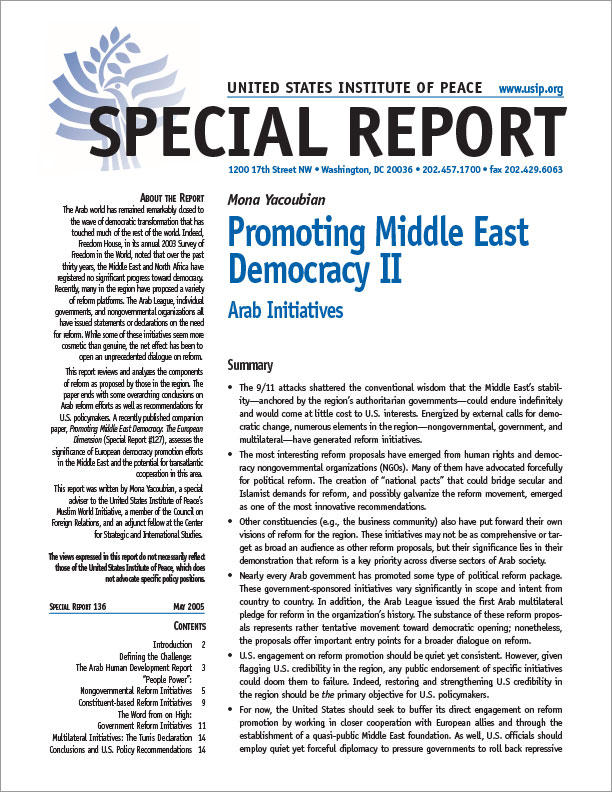Promoting Middle East Democracy II: Arab Initiatives
This report reviews and analyzes the components of reform as proposed by those in the region. The paper ends with some overarching conclusions on Arab reform efforts as well as recommendations for U.S. policymakers.

Summary
- The 9/11 attacks shattered the conventional wisdom that the Middle East’s stability— anchored by the region’s authoritarian governments—could endure indefinitely and would come at little cost to U.S. interests. Energized by external calls for democratic change, numerous elements in the region—nongovernmental, government, and multilateral—have generated reform initiatives.
- The most interesting reform proposals have emerged from human rights and democracy nongovernmental organizations (NGOs). Many of them have advocated forcefully for political reform. The creation of “national pacts” that could bridge secular and Islamist demands for reform, and possibly galvanize the reform movement, emerged as one of the most innovative recommendations.
- Other constituencies (e.g., the business community) also have put forward their own visions of reform for the region. These initiatives may not be as comprehensive or target as broad an audience as other reform proposals, but their significance lies in their demonstration that reform is a key priority across diverse sectors of Arab society.
- Nearly every Arab government has promoted some type of political reform package. These government-sponsored initiatives vary significantly in scope and intent from country to country. In addition, the Arab League issued the first Arab multilateral pledge for reform in the organization’s history. The substance of these reform proposals represents rather tentative movement toward democratic opening; nonetheless, the proposals offer important entry points for a broader dialogue on reform.
- U.S. engagement on reform promotion should be quiet yet consistent. However, given flagging U.S. credibility in the region, any public endorsement of specific initiatives could doom them to failure. Indeed, restoring and strengthening U.S credibility in the region should be the primary objective for U.S. policymakers.
- For now, the United States should seek to buffer its direct engagement on reform promotion by working in closer cooperation with European allies and through the establishment of a quasi-public Middle East foundation. As well, U.S. officials should employ quiet yet forceful diplomacy to pressure governments to roll back repressive measures such as arresting reformers, banning opposition parties, and censoring the media.
About the Report
"The Arab world has remained remarkably closed to the wave of democratic transformation that has touched much of the rest of the world. Indeed, Freedom House, in its annual 2003 Survey of Freedom in the World, noted that over the past thirty years, the Middle East and North Africa have registered no significant progress toward democracy. Recently, many in the region have proposed a variety of reform platforms. The Arab League, individual governments, and nongovernmental organizations all have issued statements or declarations on the need for reform. While some of these initiatives seem more cosmetic than genuine, the net effect has been to open an unprecedented dialogue on reform.
This report reviews and analyzes the components of reform as proposed by those in the region. The paper ends with some overarching conclusions on Arab reform efforts as well as recommendations for U.S. policymakers. A recently published companion paper, Promoting Middle East Democracy: The European Dimension (Special Report #127), assesses the significance of European democracy promotion efforts in the Middle East and the potential for transatlantic cooperation in this area.
This report was written by Mona Yacoubian, a special adviser to the United States Institute of Peace’s Muslim World Initiative, a member of the Council on Foreign Relations, and an adjunct fellow at the Center for Strategic and International Studies.
The views expressed in this report do not necessarily reflect those of the United States Institute of Peace, which does not advocate specific policy positions.




